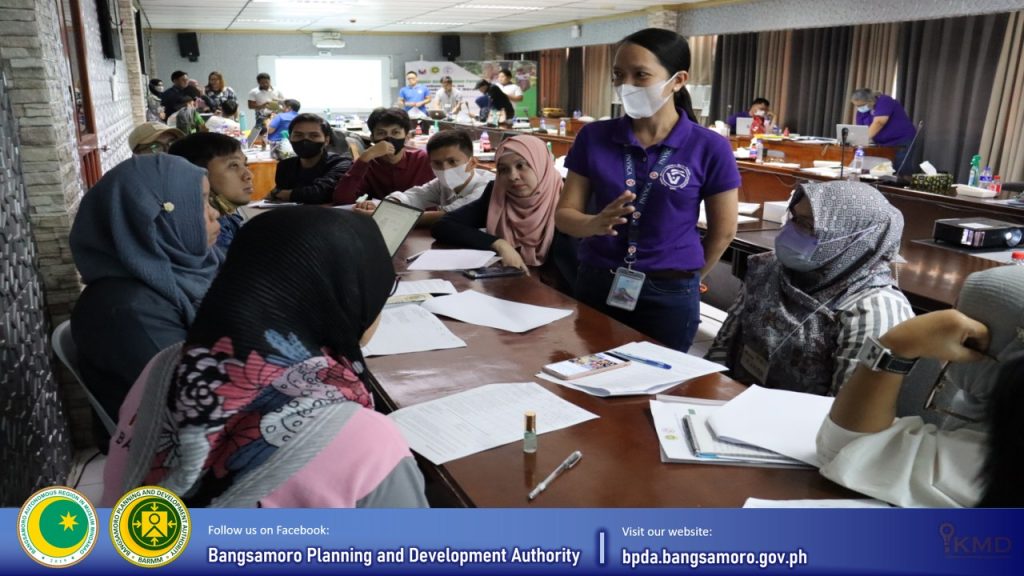
COTABATO CITY – The Bangsamoro Planning and Development Authority (BPDA) and the Philippine National Volunteer Service Coordinating Agency (PNVSCA) spearheaded Monday, June 5, the regional development forum participated by volunteers from various civil society organizations (CSOs), academic institutions, local government units (LGUs) of Maguindanao del Norte and Cotabato City, ministries, offices, and agencies in the Bangsamoro Autonomous Region in Muslim Mindanao (BARMM).
Bearing the theme “Volunteerism as a Development Strategy in Focus,” this forum aimed to appreciate the importance of volunteerism as a development strategy, describe the volunteerism status of the region according to the volunteering structure, identify the various roles of stakeholders in harnessing the potential of volunteerism as a development strategy, and prepare a roadmap or action plan to harness the potential of volunteerism as a regional strategy.
As represented by Deputy Director General Engr. Amil J. Abubakar, BPDA Director General Engr. Mohajirin T. Ali, MNSA said in his message, this forum will provide the participants with a unique opportunity to better understand volunteerism as an efficient development strategy.
“It shall bring together development actors across different sectors in the government, business sector, and civil society organizations – NGOs, academe, media, and peoples’ organizations to discuss the potential of volunteerism in our region and identify the roles of development stakeholders,” he stressed.
Furthermore, PNVSCA Executive Director Donald James D. Gawe discussed the paradigms and perspectives on volunteerism, volunteerism governance in the Philippines, volunteerism as a development strategy, and the possible contributions of LGUs, national government agencies (NGAs), CSOs, academe, and the private sector in harnessing volunteerism, while emphasizing its impact in the community.
He underscored that the National Service Training Program (NSTP), a government-mandated citizenship course for Filipino college students, is a good introduction to volunteerism. He also emphasized that NSTP is not a volunteering program.
According to International Labour Organization (ILO), volunteer work is unpaid non-compulsory work. It is a time an individual gives without pay to activities performed either through an organization or directly for others outside their own household or related family members.
Given the reality that volunteers spend for their fare, food, and others in conducting volunteer work, Gawe said “We also have to address the cost of volunteerism.”
The passage of Republic Act (RA) No. 9418 or the Volunteer Act of 2007 further strengthened the PNVSCA as the lead government agency mandated to promote volunteerism as a development strategy and coordinate programs and activities in the Philippines. Said agency also takes the lead in advocating and recognizing the contributions of volunteers to nation-building and international cooperation.
In pursuing the goals of RA 9418, PNVSCA collaborates with the sectors from the academe, the corporate, the non-for-profit, and the government in enjoining citizen participation in volunteering and building a national consciousness for volunteerism as a way of life.
Maribel Larracochea, PNVSCA’s Senior Volunteer Service Officer, presented the status of volunteerism in the region, the elements of the volunteering infrastructure, the mainstreaming of volunteerism in development planning and local governance, volunteer management, and institutionalizing volunteerism as a development strategy.
During the workshop, a rapid assessment checklist was given to the participants to rapidly gauge the status of the volunteering infrastructure in their respective LGU/NGA. This covers the three components, namely: the enabling environment, the operational structures, and implementation capacities.
In her presentation, Larracochea showed the list of national awardees on the Search for Outstanding Volunteers (SOV) from 2001-2022. In 2021, Lo Ivan Castillon and Volunteers’ Initiatives in Bridging and Empowering Society (VIBES), both from Cotabato City won the award for individual and organization categories, respectively. Acsan M. Asgar in 2020 and Aliah B. Adam in 2019, both from Lanao del Sur won the individual and individual-youth categories. Samsudin S. Muhamad of Cotabato City won the individual-adult category in 2017. A Special Citation-Posthumous was also awarded to Gabriel Canizares of Jolo, Sulu in 2010.
For her part, Macro-economic Planning Division (MEPD) Chief Camelia N. de Vera-Dacanay presented the salient features of the 2nd Bangsamoro Development Plan 2023-2028, particularly on the development issues and priority thrusts of the BARMM, and the plan’s alignment to the Sustainable Development Goals (SDGs).
Moreover, PNVSCA is an attached agency under the administrative supervision of the National Economic and Development Authority (NEDA). (𝑀𝑎𝑟𝑦 𝐿𝑜𝑣𝑒𝑙𝑙𝑎 𝐿𝑎𝑜-𝐿𝑎𝑠𝑡𝑖𝑚𝑜𝑠𝑎, 𝐵𝑃𝐷𝐴-𝐵𝐴𝑅𝑀𝑀)



